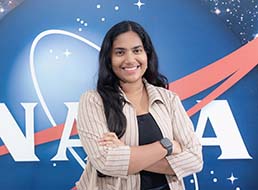Evidence for fluid migration and formation of pit complex in Pioneer Terra, Pluto
Roodra Manogaran
PhD Candidate
Department of Geology and Geophysics
Louisiana State University
Presented via Zoom
 Pit complexes on Pluto, particularly east of Sputnik Planitia, appear to be closely associated with tectonic fractures, suggesting they likely formed through an endogenic process. My research focuses on the geomorphology of pit complexes in Pioneer Terra to investigate the plausibility of these pits forming due to analogous seepage processes
Pit complexes on Pluto, particularly east of Sputnik Planitia, appear to be closely associated with tectonic fractures, suggesting they likely formed through an endogenic process. My research focuses on the geomorphology of pit complexes in Pioneer Terra to investigate the plausibility of these pits forming due to analogous seepage processes
on Earth that are potentially driven by subsurface reservoirs. On Earth, gas seep systems generally have three structural components: 1) fluid source, 2) migration pathway for the fluids, such as tectonic fractures, and 3) venting structures or seeping features near the surface, like gas pockmarks. The structural components for gas seepage on Pluto are as follows: 1) Thermogenic methane has been proposed for Pluto that is derived from the decomposition of organic materials from an organic-rich core, forming a thick methane clathrate layer. The destabilization of clathrate, due to changes in temperature and pressure could potentially trigger episodic gas outgassing. 2) As the subsurface water ocean freezes, global expansion causes tensional fracturing in the surface, encouraging surface collapse and possibly creating conduits for fluid migration. 3) Optical imagery
suggests that these pit complex features on Pluto resemble morphological features on Earth’s landscape as well. Since the specific mechanism driving pit formation remains elusive, my research addresses this gap by conducting a detailed geomorphological analysis of pit complexes to assess the potential role of gas seepage in shaping pit complexes in Pioneer Terra, Pluto. Employing geological and geophysical principles, I will discuss findings suggesting that a source-reservoir-caprock fluid migration system may be present, contributing to pit complex formation analogous to gas pockmark formation on Earth.
Refreshments served at 3:45 PM
If you have any questions about the Colloquium Series or would like to make a donation please contact the Physics Department, cua-physics@cua.edu or (202) 319-5315.
